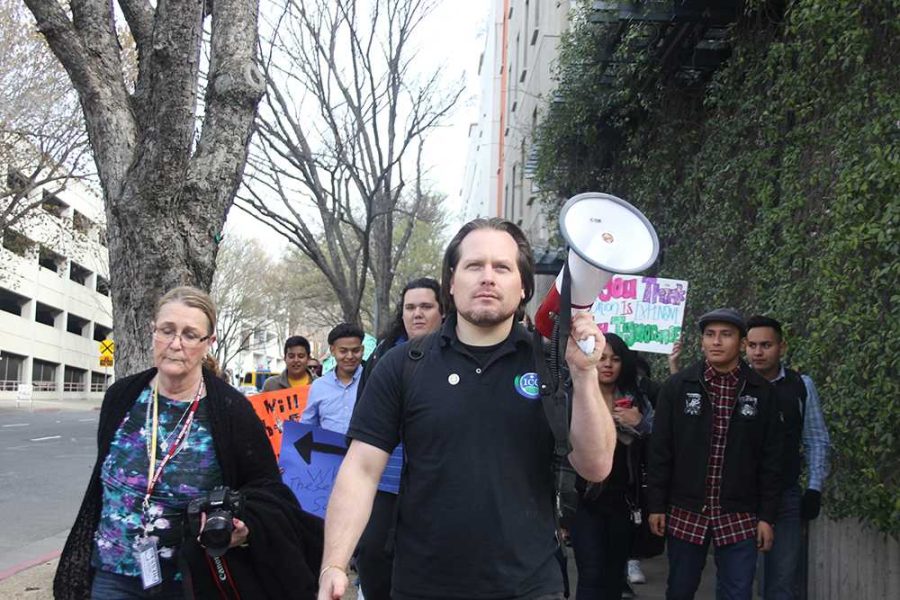California community college students gather through adversity and march for education on Sacramento capitol
Keith Montes leads students as they march for education during Sacramento’s annual March in March on March 2, 2015.
As students and faculty from community colleges all over California gathered for the annual March in March in downtown Sacramento, something was amiss.
The usual pre-march rally in Raley Field’s parking lot did not take place. Instead, students trickled onto the state Capitol’s doorstep, gathering into a small crowd that prepared to march on the California Community Colleges Chancellor’s Office.
A march that, because of several hurdles, almost didn’t happen at all.
“It was a rash decision made by the student council to decide not to have a march,” said Keith Montes, president of the Associated Students of Diablo Valley College. “Unfortunately, because word did get out that there was no march, attendance, the turnout, is the lowest I’ve ever seen. It’s difficult to call something a March in March, and try to get people to understand that there’s no march in a March in March.”
The cancellation was caused by the state defunding specific preparations that would have made the march possible, as well as the Student Senate for California Community Colleges deeming a rally at the Capitol more viable than a full march, Montes said.
“It was a specific line item towards this march,” said Mary Valdemar, a library secretary for San Bernardino Valley College. “So we’re very saddened to hear that support is not in place from the chancellors and that the board of governors is not demanding that.”
Despite the cancellation of the march, Montes pushed to put one together.
“I got word that the [Student Senate for California Community College] was no longer facilitating a march,” Montes said. “So that was disheartening … but I was able to still organize a march today.”
Students said they were pleased the march did end up taking place, and some said they’re looking for change that they feel is needed at the community college level.
“I’m just hoping we can get our point across as students to get some change to come along,” said Jose Garcia, 19, a journalism major at American River College. “Because we need some change, it’s time to improve things.”
Kimberly Miller, a 42-year-old human services major from San Bernardino Valley College, agreed and said that she just wanted legislators to hear out student issues.
After marching to the CCCCO building, students from all over took turns sharing their educational experiences and the things they hoped to see changed.
“I’m here because even though we have a Board of Governors fee waiver, which is extremely useful for paying for student tuition, I’m paying over $200 for my class textbooks,” said Cameron Weaver, senate director of public relations for ARC. “How is that public tuition going to help me when I’m shelling out a fortune for class materials.”
Vice Chancellor of California Community Colleges Paul Feist came out to speak to the chanting crowd.
“The people in this building, in the chancellor’s office, advocate every day on behalf of students,” Feist said. “When you people come from six hours away, and you show up in the lawmakers’ offices there, they see your face [and] it’s a very powerful message.”
After Feist’s speech to the crowd, Montes led a march back to the Capitol, where students were told how to push California’s legislatures to make educational reforms.
“I want to bring up ethnic studies and how that pertains to higher education,” said Jason Martinez, history major at SBVC. “[In Los Angeles,] they didn’t just make it possible, they made it mandatory for people to graduate, for people to take ethnic studies. I think that’s what we need through the state of California.”
Speakers addressed topics as broad as overall educational funding reform as well as specific issues many individuals had faced, including reform of Proposition 13 to help disabled students and financial aid reform.
“The tuition for your classes is too high,” said Cathy Johnson, 40, an occupational therapy assistant major at ARC. “If you want to keep your students you have to make it so that people can afford to go. I know people that want to go back to school, but won’t because it’s too high.”
The lesbian, gay, bisexual, transgender, questioning, intersex and asexual caucus was also there advocating for transgender rights at the community college level.
“Today what we’re doing is [promoting] trans rights and we’re visiting with legislators this afternoon especially one of the newest ones,” said Gary Walker, 38, the director of advocacy of the spectrum caucus. “We’re meeting with Sen. Ricardo Lara, Assemblymember Susan Eggmen and Assemblymember Evan Low.”
Though the crowd was smaller than prior years, Martinez praised the students who did come together.
“We didn’t need permits, we didn’t need months of planning,” Martinez said. “We made a march in about five minutes and I want everyone here to be proud of themselves for that.”
As the attendees prepared to leave, Montes had one last piece of advice for students looking to make a change.
“I want actual change and I want it today, I want it now and don’t try to censor me,” Montes said. “We want it now. Don’t get pushed around and [you] don’t always have to be polite to make a change. We demand. Power is never given, it’s only taken. Take back the power, power to the people.”

